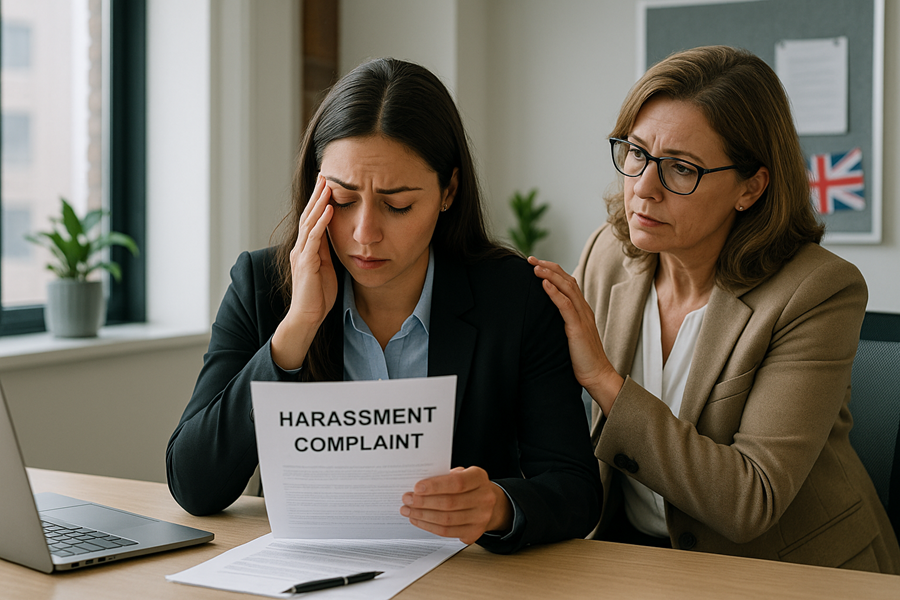What to do if you’re sexually harassed at work in the UK?

An inappropriate look, an insistent remark, and a whole day’s routine is turned upside down. Sexual harassment at work, defined as unwanted behaviour of a sexual nature that undermines dignity or creates a hostile environment, represents a reality that is all too often ignored. Yet, there are remedies available and every victim has rights. At any time, the support of a specialist sexual harassment solicitor can help you make your voice heard and protect your interests.
KEY TAKEAWAY: What to do if sexually harassed at work in the UK to protect yourself and obtain justice?
Victims can follow precise steps to stop harassment, from documenting incidents to pursuing legal action, while relying on legal remedies and specialist solicitor support to ensure their rights are respected and justice is achieved.
This step-by-step guide shows you how to report sexual harassment, make your voice heard, and take effective action to stop workplace harassment permanently.
How do you recognise sexual harassment at work?
Before you can report sexual harassment, it is essential to understand what constitutes sexual harassment at work. According to the Equality Act 2010, it represents any unwanted conduct of a sexual nature that:
- Affects your dignity or violates your personal boundaries.
- Creates a hostile, intimidating, degrading or humiliating work environment.
- Persists despite clear indication that behaviour is unwelcome.
- Occurs regardless of intent—impact on victim determines harassment.
- Can be a single serious incident or pattern of behaviour.
- Applies to all workplace relationships and hierarchies.
- Includes third-party harassment from clients or customers.
- Covers both physical and non-physical conduct.
Common examples include:
- Sexual remarks, jokes, or inappropriate comments about appearance.
- Non-consensual gestures, touching, or invasion of personal space.
- Sending messages, emails or images of a sexual nature.
- Persistant inappropriate looks or sexual advances.
- Displaying sexual content in the workplace or shared digital spaces.
- Quid pro quo harassment linking employment benefits to sexual favours.
Recognising these behaviours represnents the first step to taking action and putting an end to this unacceptable situation that violates your fundamental workplace rights.
Immediate steps to stop harassment: Your action plan
When inappropriate sexual harassment at work occurs, swift action protects your rights and safety. Follow these essential steps to stop harassment through effective sexual harassment reporting:
- Document every incident: Record comprehensive details including date, time, location, exact description of what occurred, witness names and contacts, your response, the harasser’s reaction, and any physical evidence like screenshots or emails. Document the impact on your work performance and wellbeing to build bulletproof evidence for your case.
- Make your opposition crystal clear: State directly that the behaviour is unacceptable and must stop immediately. Document your refusal in writing when safe to do so, keep copies of all communications expressing opposition, and avoid any ambiguous responses that could be misinterpreted as consent or encouragement.
- Review company harassment policy: Examine your employer’s internal sexual harassment reporting procedures by locating the official harassment policy in your employee handbook, identifying designated reporting contacts and investigation timelines, and understanding confidentiality protections and anti-retaliation measures available.
- Report formally through internal channels: Initiate formal sexual harassment reporting within your organisation by submitting a written complaint to your line manager, HR department, or designated officer. Include all documented evidence and witness information, request written acknowledgement of your complaint, and specify the remedies sought and protection needed.
- Preserve all documentation meticulously: Maintain comprehensive records throughout the entire process by keeping copies of your complaint and all employer responses, documenting any retaliatory behaviour following your report, saving all relevant emails and communications, and recording any changes to your working conditions or treatment.
Employers’ legal sexual harassment duty and prevention obligations
UK law imposes a strict sexual harassment duty on employers to ensure a safe, respectful and harassment-free working environment. This duty includes practical measures to effectively prevent sexual harassment.
Victims’ fundamental rights
Victims of sexual harassment at work have fundamental rights guarantee protection and support:
- Freedom from all forms of harassment and post-reporting retaliation.
- Access to clear, confidential, and accessible complaint procedures.
- Right to prompt, impartial, and thorough investigation of reported incidents.
- Entitlement to work in environments free from discrimination and hostility.
- Support during investigation and disciplinary processes.
- Reasonable adjustments to prevent further harassment.
Compensation for financial and emotional losses suffered.Employers’ comprehensive legal obligations
To comply with their sexual harassment duty, employers must implement comprehensive prevention strategies:
- Policy development and communication: Establish clear, comprehensive sexual harassment policy detailing prohibited behaviours, communicate policy to all employees through multiple channels, regularly update policy to reflect legal changes and best practices, and ensure policy accessibility in multiple languages where appropriate.
- Risk assessment and prevention: Conduct regular sexual harassment risk assessment to identify vulnerabilities, assess workplace culture, power dynamics, and environmental factors, implement targeted prevention measures addressing identified risks, and monitor effectiveness of prevention strategies through regular review.
- Training and awareness: Provide mandatory sexual harassment awareness training for all staff, deliver specialised training for managers and supervisors, create ongoing awareness campaigns promoting respectful workplace culture, and ensure training covers bystander intervention and reporting procedures.
- Investigation and response procedures: Establish prompt, fair, and thorough investigation processes, guarantee confidentiality while ensuring effective fact-finding, implement appropriate disciplinary measures for substantiated cases, and provide ongoing support and monitoring for affected employees.
Through these comprehensive actions, employers fulfill their sexual harassment duty, promote healthy working environments, limit legal exposure, and strengthen trust within their teams.
What is the role of ACAS in sexual harassment reporting?
When internal procedures fail or if you prefer an external intervention, ACAS plays a key role in resolving conflicts related to sexual harassment at work through impartial mediation and legal guidance.
- Access free ACAS services: Contact ACAS for confidential mediation between you and your employer, expert guidance on resolution options and remedies, practical advice on your employment law rights, and cost-effective alternatives to employment tribunal proceedings.
- Complete mandatory early conciliation: Submit online notification to ACAS within three months of the harassment incident, participate in conciliation discussions if your employer agrees, allow ACAS conciliator to facilitate settlement negotiations, and obtain Early Conciliation certificate regardless of outcome.
- Leverage settlement benefits: Pursue faster resolution than tribunal proceedings, maintain confidential settlement avoiding public hearings, preserve working relationships where possible, and reduce legal costs and emotional stress through professional mediation.
- Secure timeline extensions: Use Early Conciliation to automatically extend your tribunal claim deadline, gain additional time for resolution while preserving legal rights, and document attempted alternative resolution for stronger tribunal position if conciliation fails.
If ACAS conciliation proves unsuccessful, your certificate enables employment tribunal proceedings with demonstrated good faith attempts at resolution.
Taking your case to employment tribunal
If ACAS conciliation fails or you choose direct legal action, employment tribunals provide specialist forums for resolving sexual harassment at work disputes with binding legal remedies.
Tribunal claim process:
- Prepare comprehensive documentation: Gather all evidence including incident records, witness statements, internal complaints, employer responses, and impact documentation on health and work performance.
- Complete ET1 claim form: Submit detailed online or postal application specifying harassment facts, legal grounds, remedies sought, and supporting evidence attachments.
- Employer response phase: Your employer receives 28 days to file ET3 response, typically denying allegations and raising technical defences to discourage proceedings.
- Case management conference: Complex cases require preliminary hearings where tribunals set timetables, resolve procedural disputes, and clarify legal issues for final hearing.
- Evidence exchange period: Both parties disclose relevant documents, exchange witness statements, and prepare comprehensive hearing bundles within court-imposed deadlines.
- Final hearing proceedings: Tribunals hear evidence from all parties, witness testimony, cross-examination, and legal arguments before reaching binding decisions on liability and remedies.
Employment tribunals provide authoritative legal resolution when other steps to stop harassment prove insufficient to secure justice and workplace protection.
Do I need a solicitor if I am the victim of sexual harassment at work?
Initially, you can try to resolve the problem by following your company’s internal procedure or via ACAS. However, it is advisable to consult a specialist employment solicitor if:
- You feel uncomfortable or threatened by the situation,
- Management does not take your complaint seriously,
- You want to understand your rights precisely,
- You are considering going to court,
- You need help to build a solid case and be properly supported.
Professional legal support ensures what to do if sexually harassed becomes a strategic pathway to justice rather than an overwhelming bureaucratic maze.
FAQs
1. Can I report sexual harassment even if the perpetrator is a colleague and not my superior?
Yes, sexual harassment is prohibited regardless of the person’s status. You can and must report any inappropriate behaviour.
2. What should I do if I am sexually harassed by a customer or supplier?
You can also report this type of harassment to your employer who has a duty to protect you, even from third parties.
3. Can sexual harassment involve non-physical gestures?
Yes, harassment also includes unwanted comments, insistent looks, messages or any form of communication with a sexual connotation.
4. How can I prove sexual harassment if I have no witnesses?
Precise documentation, screenshots, detailed notes and your own testimony are key elements, even if there are no direct witnesses.
5. What do employers have to do legally to prevent sexual harassment?
They must conduct risk assessments, implement clear policies, provide awareness training, establish reporting mechanisms, and investigate complaints promptly to fulfill their duty to prevent sexual harassment.
Sexual harassment in the workplace represents a serious breach of your fundamental rights, but effective remedies exist to combat it successfully. Don’t hesitate to act quickly, protect yourself and assert your rights using the appropriate legal procedures and professional support.
Your voice counts: Stop workplace harassment!
Contact Qredible’s harassment specialists today – because your dignity at work is non-negotiable.
KEY TAKEAWAYS
- Recognising and documenting sexual harassment at work promptly through systematic sexual harassment reporting is essential for effective legal action and workplace protection.
- Employers have comprehensive sexual harassment duty obligations including policy development, sexual harassment risk assessment, and prevention training to create harassment-free environments under the Equality Act 2010.
- Professional solicitor representation significantly improves case outcomes by providing strategic expertise, evidence development, and skilled negotiation to maximise compensation and ensure effective resolution.
Articles Sources
- gov.uk - https://www.gov.uk/sexual-harassment-your-rights
- acas.org.uk - https://www.acas.org.uk/sexual-harassment
- equalityhumanrights.com - https://www.equalityhumanrights.com/en/advice-and-guidance/sexual-harassment-workplace
- citizensadvice.org.uk - https://www.citizensadvice.org.uk/work/rights-at-work/sexual-harassment-at-work/
- gov.uk - https://www.gov.uk/employment-tribunals/sexual-harassment-and-discrimination-cases
Do you need a solicitor?
Find a solicitor on Qredible in just a few easy steps

















